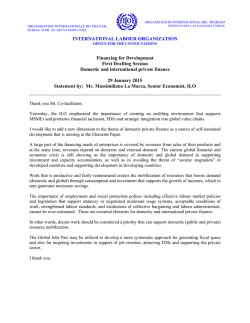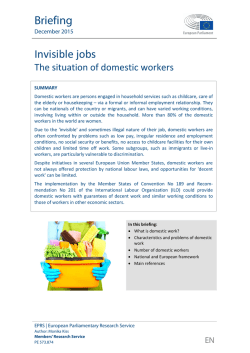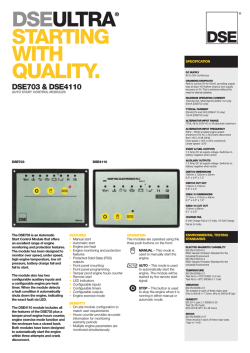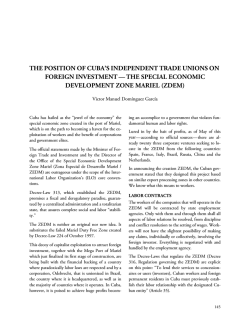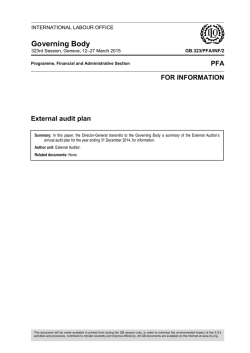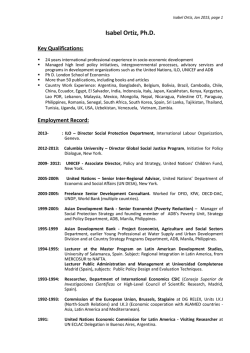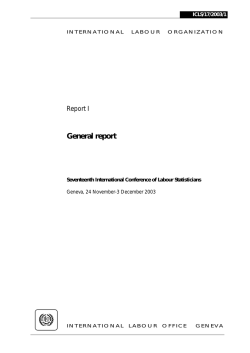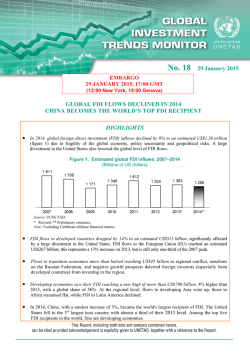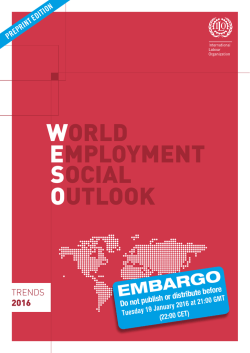
ILO
ORGANIZACION INTERNACIONAL DEL TRABAJO ORGANISATION INTERNATIONALE DU TRAVAIL OFICINA PARA LAS NACIONES UNIDAS BUREAU AUPR ÈS DES NATIONS UNIES INTERNATIONAL LABOUR ORGANIZATION OFFICE FOR THE UNITED NATIONS Financing for Development First Drafting Session General Discussion 28 January 2015 Statement by: Mr. Massimiliano La Marca, Senior Economist, ILO Co-facilitators, Excellency, distinguished representatives ILO recognizes the progress made by member states, since the Monterrey consensus and the Doha Declaration, in creating and developing national SPFs and moving toward the ambitious and long-term goal of DW for all. The process of development can be compared to the working of an engine that enhances the livelihoods of people through raising incomes and operates through structural transformation, productivity increases and employment creation. Such an engine works as a self-sustained process and it mostly generates its resources internally in a “virtuous circle” of economic growth, increasing incomes and enhanced capacity to generate revues that can be mobilized and directed to most productive economic and social uses. Yet, it needs a supportive external environment and, in many cases, external support for starting and it must be kept in motion until a selfsustained process is underway. The ILO is pleased to see the references made to Social Protection Floors in the Elements Paper. Evidence shows that Social Protection is an investment in “social infrastructure”, that generates returns enhancing capacity, facilitating structural change, better employment and domestic resource mobilization. Well-designed Social Protection systems become a fundamental element of that self-sustaining development engine. The ILO welcomes the idea (indicated in the Annex) of creating a fund to help finance SPFs in the poorest countries supported by Development Assistance. ILO can support member states in designing such Fund and continue to help creating and developing national SPFs. There are many policy elements that were established in Monterrey and Doha that should not be lost in this process. For example, we encourage Member States to take a careful look at the connections between decent work and financing for development. Expanding wage employment and promoting decent work has profound implications for macroeconomic policy, international trade, industry policy and the incentives used to attract foreign direct investment ILO recognizes the importance of strategically integrating economies in the Global Value Chains and promoting Direct Investment as a source of development and job creation. Strengthening regulatory framework and labor standards, are key factors to make such trade and investment integration a source of inclusive and sustainable development and DW. Therefore, investment promotion policies must go hand in hand with industrial policies by prioritizing sectors with high growth and jobs potential and underscore the importance of increasing vigilance and respect for international labour standards, acknowledging the important role of the ILO Tripartite Declaration of Principles on Multinational Enterprises as a framework for embedding FDI in national development and for guiding investment policies of institutional investors and investment in the supply chains. ILO supports the proposed policy ideas on “strengthening the sustainable development impact of investment” and “Aligning investment agreements with sustainable development policies and plans” in the Annex. Many countries are increasingly using labour and social policies to address structural challenges and expand domestic resources. Employment creation can create the resources to boost consumption by improving purchasing power and raises rates of savings to finance investments and further development. Increased consumption reduces poverty and generates demand. High and prolonged levels of unemployment inhibit growth in consumption and investment and make a reduction in fiscal deficits much harder to achieve. Therefore, decent work ought to be considered both a priority for which finances should be directed as well as a primary tool for domestic resource mobilization. The Global Jobs Pact may be utilized to develop a more systematic approach for job creation at the national level which in turn can help mobilize domestic resources, attract FDI and prioritize investments in favour of job creation and create the fiscal space to invest in decent work. Finally, a self-sustained engine of development cannot work without and enabling domestic environment that supports MSME and promotes financial inclusion. ILO supports the proposed policy ideas on “increasing access to finance for micro, small and medium enterprises (MSMEs)” of the Annex, as a domestic financial system that allows SMEs to create decent jobs and support structural transformation is key for development. We commit to support firms in the real economy, especially small and medium enterprises, to allow them to grow and create decent jobs including by facilitating improvements in both the quantity and quality of lending through smart regulations, incentives and other measures to encourage the financial sector to serve a more efficient role in the economy. The ILO looks forward to contributing to the discussions to ensure the Financing for Development Conference is a success. I thank you.
© Copyright 2026
